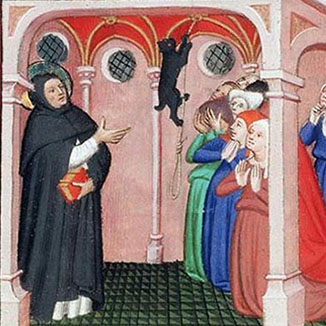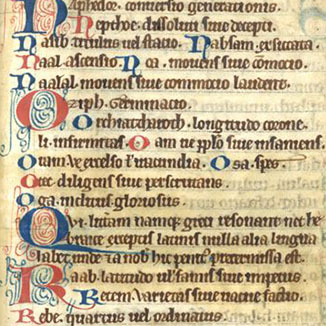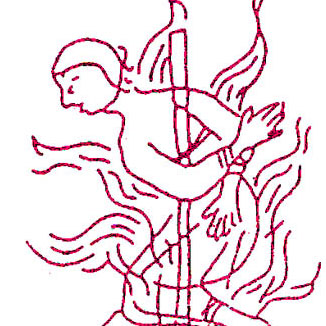




None of the sites visited are difficult for anyone of average fitness. Sites on hill tops typically require an uphill walk on a rough path, but they are not particularly steep.
Aguilar — ![]() — Cathar Château.
— Cathar Château.
Albi — ![]() — picturesque town which gave its name to the Albigensian Crusade,
Cathedral, palace, viestiges of Cité and site of medieval castles.
— picturesque town which gave its name to the Albigensian Crusade,
Cathedral, palace, viestiges of Cité and site of medieval castles.
Alet-les-Bains — ![]() — Natural spring, Medieval Cité, Ruined Abbey / Cathedral.
— Natural spring, Medieval Cité, Ruined Abbey / Cathedral.
Arques — ![]() — Crusader Château & museum. Click for more about tours
of the Château at Arques
— Crusader Château & museum. Click for more about tours
of the Château at Arques
Avignonet — ![]() — Site of a Château belonging to the Count of Toulouse where
a team of inquisitors were murdered in 1242.
— Site of a Château belonging to the Count of Toulouse where
a team of inquisitors were murdered in 1242.
Béziers — ![]() — City and Cathedral. Site of the famous massacre of 1209.
— City and Cathedral. Site of the famous massacre of 1209.
Bram — ![]() — Circulade & site of an atrocity during the War against the
Cathars.
— Circulade & site of an atrocity during the War against the
Cathars.
Cabaret (Lastours) — ![]() — 3 Cathar Châteaux + medieval village.
— 3 Cathar Châteaux + medieval village.
Carcassonne — ![]() — Cathar Château (Château Comtal), Cité, Basilica,
museum, Canal du Midi. Click for more about tours of Carcassonne
— Cathar Château (Château Comtal), Cité, Basilica,
museum, Canal du Midi. Click for more about tours of Carcassonne
Cordes-sur-Ciel — ![]() — Bastide founded by Raymond VII, Count of Toulouse, as a stronghold
and refuge for dispossessed Cathars.
— Bastide founded by Raymond VII, Count of Toulouse, as a stronghold
and refuge for dispossessed Cathars.
Foix — ![]() — Cathar Château, Capital of the medieval county of Foix.
— Cathar Château, Capital of the medieval county of Foix.
Fontfroide — ![]() — Cistercian Abbey.
— Cistercian Abbey.
Hautpoul — ![]() —
Cathar stronghold besieged by Simon de Montfort. Vestiges
of two castles.
—
Cathar stronghold besieged by Simon de Montfort. Vestiges
of two castles.
Lagrasse — ![]() — Benedictine Abbey.
— Benedictine Abbey.
Lastours (Cabaret) — ![]() — 3 Cathar Châteaux + medieval village. Click for more about
Lastours
— 3 Cathar Châteaux + medieval village. Click for more about
Lastours
Lavaur — ![]() — Cathedral, site of atrocity during the Cathar Wars.
— Cathedral, site of atrocity during the Cathar Wars.
Le Bezu — ![]() — Cathar Château.
— Cathar Château.
Les Casses— ![]() — Vestiges of Cathar town and site of a mass burning of Cathar
Perfects.
— Vestiges of Cathar town and site of a mass burning of Cathar
Perfects.
Mazamet — ![]() — Museum of Catharism.
— Museum of Catharism.
Minerve — ![]() — Cathar City and Château.
— Cathar City and Château.
Montaillou — ![]() — the famous Cathar village where everyone was arrested by the
Bishop of Pamiers.
— the famous Cathar village where everyone was arrested by the
Bishop of Pamiers.
Montsegur — ![]() — Cathar Château, medieval village & museum. Click for
more about Montségur
— Cathar Château, medieval village & museum. Click for
more about Montségur
Muret — ![]() — Site of an open battle where King Peter
II of Aragon was killed.
— Site of an open battle where King Peter
II of Aragon was killed.
Peyrepertuse — ![]() — Cathar Château.
— Cathar Château.
Prouille — ![]() — The first Dominican convent, founded by St Dominic.
— The first Dominican convent, founded by St Dominic.
Puilaurens — ![]() — Cathar Château.
— Cathar Château.
Puivert — ![]() — Cathar Château & museum. Click for more about tours of
Puivert
— Cathar Château & museum. Click for more about tours of
Puivert
Queribus — ![]() — Cathar Château.
— Cathar Château.
Rennes-le-Château — ![]() — Roman town, now a Hilltop Village with a notable church &
museum.
— Roman town, now a Hilltop Village with a notable church &
museum.
St Hilaire — ![]() — Benedictine Abbey.
— Benedictine Abbey.
Termes — ![]() — Cathar Château + medieval village. Click for more about
Termes
— Cathar Château + medieval village. Click for more about
Termes
Toulouse — ![]() — Capital of the county of Toulouse,Museums, Cathedral, important
Churches.
— Capital of the county of Toulouse,Museums, Cathedral, important
Churches.
Villerouge Termenes — ![]() — Château of the Archbishop of Narbonne where the last known
Cathar parfait was burned alive.
— Château of the Archbishop of Narbonne where the last known
Cathar parfait was burned alive.
Key
![]() —
Very easy walk on the flat, OK for wheelchair users
—
Very easy walk on the flat, OK for wheelchair users
![]() —
Easy walk on the flat, with steps
—
Easy walk on the flat, with steps
![]() —
Easy walk, c15 mins
—
Easy walk, c15 mins
![]() —
Moderate walk, rough paths, hilly. c30 mins.
—
Moderate walk, rough paths, hilly. c30 mins.
![]() — Moderate walk, rough paths, hilly. c45 mins.
— Moderate walk, rough paths, hilly. c45 mins.
The walks are not particularly steep or dangerous, but stones
can be slippery in wet weather. French standards of maintenance
and the provision of safety rails might not be what you are used
to at home. We recommend taking hiking sticks for sites rated
![]() and
above.
and
above.


The Languedoc is highly seasonal, but over the last few years weather has become less predictable. You should therefore bring a range of clothing, including waterproofs. You should also allow for extremely hot weather in the summer (light clothing, sun hats, sun cream, etc). Some Cathar Castles are located on mountain tops. Climbs are not too demanding - 10-40 mins, but there are usually no facilities at the top. Safety precautions in France are not the same as those in most English speaking countries, so sturdy footware and hiking sticks are recommended as a few of the paths are very uneven. Holiday Insurance is recommended, as is a mobile telephone (cellphone).
Other things you might find useful: camera, torch, binoculars, map of the languedoc, compass, books on the Cathars or Cathar Castles. (see Recommended Reading, below)


You do not need to know anything at all about Catharism or the Cathars to come on our tours, but you might get more out of it if you have some familiarity with the subject.
There are lots of books on the subject in English as well as in French. Many are very good. Below are some of our recommendations for books in English, divided into general reading and advanced reading. If you click on the links you will go to reviews in a new window, which in turn will link to Amazon if you like the look of any of them (both com and co.uk)
Zoë Oldenburg, Massacre at Montsegur: a history of the Albigensian Crusade
Malcolm Barber, The Cathars, Dualist Heretics in Languedoc in the High Middle Ages
Stephen O'Shea, The Perfect Heresy: The Revolutionary Life and Death of the Medieval Cathar
Emmanuel Le Roy Ladurie, Montaillou: village Occitan, 1294-1324
Jonathan Sumption, The Albigensian Crusade
René Weis, The Yellow Cross: The Story of the Last Cathars, 1290-1329
Michael Costen, The Cathars and the Albigensian Crusade
Marcus Cowper, Cathar Castles, Fortresses of the albigensian Crusade 1209-1300
James McDonald, Kill Them All! Did a Medieval Abbot give this Command to His Crusader Troops?
William of Tudela and an Anonymous Successor (J. Shirley, translator,) The Song of the Cathar Wars
Walter L Wakefield and Austin P Evans, Heresies of the High Middle Ages
H J Warner, Albigensian Heresy (2 vols)
Steven Runciman, The Medieval Manichee, A Study in the Christian Dualist Heresy


None of the sites we visit are inaccessible for participants of average fitness. While sites on hill tops typically require uphill walks on rough paths, most take less than 30 minutes. (Incidentally, in photographs the walks tend to look harder than they really are).
The walks are not particularly steep or dangerous, but stones can be slippery in wet weather. Montsegur and Peyrepertuse are more difficult a climb than the other sites. The paths we use are maintained in a relatively natural form – meaning that you will find few concrete steps or railings, but they also lack chasms, pot-holes or slippery gravel. They are often lined with box trees that serve as hand rails in turns and other key points. The things we caution guests about include the occasional tree trunk semi-buried on the path and narrow portions of trail.
French standards of maintenance and the provision of safety rails might not be what you are used to at home, so we recommend bringing hiking sticks.
For ratings showing the relative difficulty of all sites included on our tours, see the list at Locations
James offers the insights of a historian to Cathar Country Tour participants. Think of him as the history teacher you always wished you had had. Better yet, James brings his deep knowledge of the history and the sites of the Cathar region out of the classroom and to the very places where history was made. His broad and deep understanding of the region’s history is based on decades of meticulous research into the theological, academic and scholarly sources that illuminate the region and its history. Our clients praise his erudition, enthusiasm and flair for addressing the level of his audience.
James will paint a coherent picture of both the specific events and personalities linked to each site you visit with him and its contribution to the bigger historical tableau. His combination of wit and erudition enable him to make complex historical themes accessible in a way that is unique and memorable. He does not need or use scripts, and is unlikely to be unable to answer any question you might have.
As the father of an inquisitive young son, James is comfortable answering the many questions younger family members have (in fact, he reports that they pose some of the best questions). So feel free to include them in the tour if you feel they would benefit from the experience (children under age 16 are half price). On the other hand, because not every child is looking for this kind of experience we can arrange day-care with a trusted and registered nanny.
We guarantee that 75% of what you will see and learn will be different from from what you have seen and heard before. It is likely to be more like 90%. Most of our clients have previously seen Carcassonne, and not one has so far been disappointed by their tour with James.
While our tours will always highlight key Cathar sites and history, James has lived in the region for decades and shares your passion for those (and many other) topics. He is delighted by the opportunity to explore these themes with our guests. Ancient hominids, Greeks, Etruscans, Romans, Celts, Visigoths, Moors, Knights Templar, Medieval Counts, Troubadours and others have all left traces behind and James is uniquely qualified to bring this rich heritage to life. The Languedoc is studded with spectacular mountains, megaliths, caves, castles, churches, abbeys, wildlife, thermal springs and even dinosaur fossils. As an Oxford-educated scholar like James, this region is a living library of human and natural history that he passionately believes must be shared with a wider audience.
Because our goal is to make your visit the most memorable experience possible, we offer tour options that include aperitifs, local wines, local delicacies, and other enhancements in carefully selected venues.
We will be part of an organized coach tour of the region and would like to have James join us for a day or two; what arrangements can you make for us?
James can meet your group anywhere in the Languedoc and adjacent regions to provide expert insights tailored to your touring plans. Because we are a small, family-owned business we have the flexibility to adjust to your needs. In fact, part of what makes Cathar Country Tours unique is our ability to work with guests (and tour organizers) to customize our services. Pricing information is available for a variety of options.
In addition to scheduled tours, which generally accommodate up to 7 guests, we offer customized tours limited to you and other members of your party. We guarantee both exclusivity and the flexibility to match your specific interests. To explore all the options available, Contact Us.
We set the scheduled tour dates ourselves and are committed to doing each of these tours regardless of the number of participants.
Fortunately, the weather here is good most days of the year. Like everywhere else, blustery weather occasionally occurs but it is rarely severe enough to cancel an outing. On those rare days when weather conditions force a cancellation, the tour can be either rescheduled or we visit one of the sites indoors. Participants are encouraged to wear sensible walking shoes for all weather conditions and to bring wind breakers or other suitable attire in the case of showers or windy weather. To date we have never had to cancel a tour.
Should you have unexpected, unavoidable alterations to your holiday plans we can offer an alternative scheduled tour or provide a letter required for your travel insurance claim.
Yes, we have found that pre-existing groups work well for all parties and we can offer discounted rates. Contact us to discuss potential arrangements.
Many museums, abbeys and castles we visit sell themed items and time will be available to do some quick shopping in those cases, but to accommodate the schedules of all participants, post office stops and the like are limited on scheduled group tours. Adequate time is allowed in all our schedules for rest stops. Customized tours can, of course, be designed to address any of your special wishes, including our insights on shopping for wine, cheese and other local temptations. Please enquire in advance.
Yes. We make special arrangements to avoid queues and crowds.
|
|
A selection of our tours and other services. Click on one of the boxes for more information

Join one of our scheduled week-long tours which take place in May/June and September each year, including iconic sites such as Montsegur.

Customised Tours for 1 person to 5 people: you get to chose how long the tour is, where you visit, and what topics you want to learn about.

Customised Tours for groups of 6 or more: you get to chose how long the tour is, where you visit, what topics you want to learn about, and where you stay.

Audio tours - just download an app onto your cell 'phone and do the tour at your own pace. These self-guided tours use GPS to direct you and trigger appropriate audio tracks.

James is available internationally for talks, formal lectures and seminars on the Cathars, Occitania, the Albigensian Crusade, Gnosticism and Dualism.

James is available as an historical consultant on the Cathars, Occitania, the Albigensian Crusade, and Gnosticism and Dualism, and for media appearances.